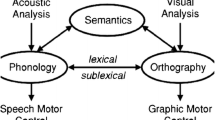Abstract
In this research, develops a novel system using Multimodal Interface Device for supporting the rehabilitation of aphasia. The system supports diagnosis by conducting statistical analysis of the diagnostic result. So, it’s necessary to share a check result by uploading large-volume data in a data server. It is possible to simply perform comparison between data sets and upload patient’s data into a database based on previous statistics.
Access this chapter
Tax calculation will be finalised at checkout
Purchases are for personal use only
Similar content being viewed by others
References
Rehabilitation following acquired brain injury, Royal College of Physicians, 23 July. https://www.rcplondon.ac.uk/sites/default/files/documents/rehabilitation-followingacquired-brain-injury.pdf
Johansson, M.B.: Aphasia and Communication in Everyday Life: Experiences of persons with aphasia, significant others, and speech-language pathologists. Doctoral thesis of Uppsala University (2012)
Obo, T., Kusaka, J., Kubota, N., Nitta, O., Matsuda, T.: Informationally structured space for computational system rehabilitation. In: Proceedings of 2014 IEEE International Conference on System, Man, and Cybernetics (2014)
Japan Society for Higher Brain Dysfunction: Standard Language Test of Aphasia Manual, 2nd edn. 6th impression. Shinko Medical Publisher (2013)
Kubota, N., Sotobayashi, H., Obo, T.: Human interaction and behavior understanding based on sensor network with iPhone for rehabilitation. In: Proceedings of the International Workshop on Advanced Computational Intelligence and Intelligent Informatics (2009)
Kubota, N., Yorita, A.: Topological environment reconstruction in informationally structured space for pocket robot partners. In: Proceedings of the 2009 IEEE International Symposium on Computational Intelligence in Robotics and Automation (CIRA 2009), Daejeon, Korea, pp. 165–170 (2009)
Kubota, N., Botzheim, J., Obo, T.: Human motion tracking and feature extraction for cognitive rehabilitation in informationally structured space. In: Proceedings of the 9th France-Japan and 7th Europe-Asia Congress on Mechatronics and the 13th International Workshop on Research and Education in Mechatronics (REM), Paris, France, pp. 464–471 (2012)
Botzheim, J., Obo, T., Kubota, N.: Human gesture recognition for robot partners by spiking neural network and classification learning. In: Proceedings of Joint 6th International Conference on Soft Computing and Intelligent Systems and 13th International Symposium on Advanced Intelligent Systems (SCIS & ISIS 2012), Kobe, Japan, pp. 1954–1958 (2012)
Hiwada, E., Aoki, O., Kubota, N.: Appearance and motion pattern generator of balls in a support system for diagnosis of unilateral spatial neglect. In: Proceedings of the 21st Fuzzy, Artificial Intelligence, Neural Networks and Computational Intelligence, pp. 47–50 (2011) (in Japanese)
Browndyke, J.N.: Aphasia Assessment. Neuropsychology Central, pp. 1–7 (2002)
Lezak, M.: Neuropsychological Assessment. Oxford University, New York (2012)
Mazec, MetaMoji Corporation. http://www.product.metamoji.com/en/mazec/
Author information
Authors and Affiliations
Corresponding author
Editor information
Editors and Affiliations
Rights and permissions
Copyright information
© 2016 Springer International Publishing Switzerland
About this paper
Cite this paper
Mabuchi, T., Sato, J., Takeda, T., Kubota, N. (2016). Rehabilitation Support System Using Multimodal Interface Device for Aphasia Patients. In: Kubota, N., Kiguchi, K., Liu, H., Obo, T. (eds) Intelligent Robotics and Applications. ICIRA 2016. Lecture Notes in Computer Science(), vol 9835. Springer, Cham. https://doi.org/10.1007/978-3-319-43518-3_38
Download citation
DOI: https://doi.org/10.1007/978-3-319-43518-3_38
Published:
Publisher Name: Springer, Cham
Print ISBN: 978-3-319-43517-6
Online ISBN: 978-3-319-43518-3
eBook Packages: Computer ScienceComputer Science (R0)




